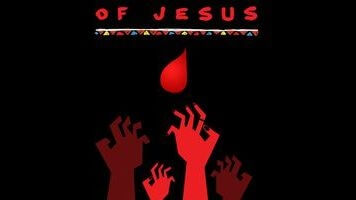Spike Lee’s Da Sweet Blood Of Jesus could use a transfusion of passion

Love him or loathe him, there’s little denying that Spike Lee knows how to open a picture. His latest joint—an “official” one, per the credits, though that raises the question of which projects Lee considers “unofficial”—commences with a joyous display of acrobatic expression. Four men glide, twist, and shimmy, reaching for the heavens, their ecstatic solo routines set to a poignant plink of piano. Motion has always been a key tenet of Lee’s filmography, reflected both in his areas of interest—dance, basketball, sex, revolution—and in the kinetic plunge and swoop of his camera. So this prologue, “moving” by several definitions, fits snugly into that tradition. What it doesn’t do is relate much to the film that follows, a ponderous vampire romance that surely ranks among the writer-director’s most sedate, immobile studies of black life in America.
Shot in just 16 days, on a shoestring budget of Kickstarter contributions, Da Sweet Blood Of Jesus finds Lee struggling to reinvent himself as a true independent after years of securing financing through more conventional avenues. Like his last feature, the journeyman studio job Oldboy, it’s a mostly faithful remake—in this case, a modernized spin on the 1973 cult curiosity Ganja & Hess, which used vampirism as a gateway into black identity. Lee approaches the task like a famous musician recording a close cover: Though his personality is never less than present, especially in the blare of wall-to-wall soundtrack selections, the basic shape of the original remains intact. Somehow, reverence to the text extinguishes the fire in Lee’s belly. Or maybe he just wanted to make a movie as cold as the plasma pumping through his characters’ undead veins.
Scene for scene, sometimes line for line, Blood sticks to the blueprint of its source material; Bill Gunn, who made Ganja & Hess under the (ignored) directive to deliver a Blacula-style “black vampire movie,” shares a screenwriting credit with Lee. Here, again, is an affluent archeologist, Dr. Hess Greene (Stephen Tyrone Williams), whose unstable research assistant stabs him with an ancient, pointy artifact before committing suicide. Hess awakes with an insatiable appetite for the red stuff, and first indulges it by lapping up the puddle around his attacker’s stiffening corpse. From there, he mostly just chills at his sprawling Martha’s Vineyard mansion, making the occasional daytrip to New York to dispassionately feast on—and turn—some unlucky lady. Eventually, the dead assistant’s wife, Ganja Hightower (Zaraah Abrahams), comes looking for her husband, and instead cozies up with the coolly intellectual fiend.
As in a lot of indie bloodsucker flicks, like Michael Almereyda’s Nadja (which gets a referential nod), the supernatural hex is really a metaphor for addiction—a focus carried over from Gunn’s film. This being a Lee production, there are also stray observations about race, class, and religion, bubbling on the edges of the picture and occasionally seeping their way into conversation. (When asked what she’d do with the secret of immortality, one future victim claims she’d share it with a younger generation, because “in this world, black children need to be indestructible.”) Is the film about how a legacy of racism and oppression has doomed black Americans to an eternity of social alienation? Is it about the power/curse of assimilation into white culture? Or the way the church functions as just another false opiate for the disenfranchised? Blood never coagulates, thematically speaking. Nor does it function well as a doomed romance, in part because Lee trades the dreamlike haze of Ganja & Hess for a chilly remove.
For this most inconsistent of master directors, there has to be a middle ground between anonymous work-for-hire gigs like Oldboy and DIY messes like this. Red Hook Summer, Lee’s last dalliance into micro-indie territory, suggested that he might have temporarily lost his grasp on basic cinematic language. He remembers it here; there’s a glorious transition in which Williams rises out of frame, revealing that the picture hanging behind him is actually the film’s next shot. But the trade-off seems to be a fatal flag in energy, the quality that makes even his worst misfires worth watching. As if aware of how bloodless Blood feels, Lee fills almost every pocket of dead air with music—the licensing fees must have far surpassed the filming budget—and tosses in a fairly pointless and gratuitous lesbian sex scene. None of these tricks come close to reviving the sheer enthusiasm of that opening dance montage, a reminder of the high a Spike Lee film can induce. For a passion project, Da Sweet Blood Of Jesus is sadly lacking in passion.
Da Sweet Blood Of Jesus is now available to rent through Vimeo. It opens in select markets on Friday.